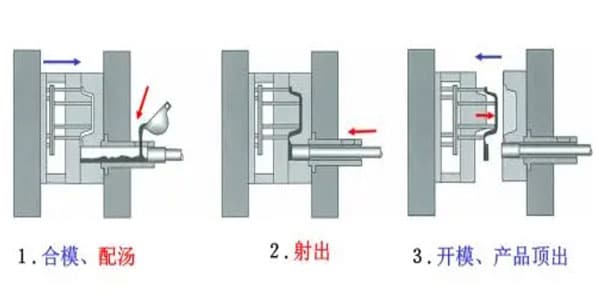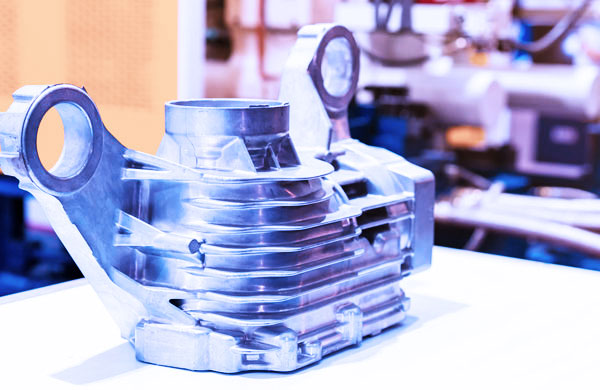More About Alcast Company
More About Alcast Company
Blog Article
Alcast Company - An Overview
Table of ContentsGetting My Alcast Company To WorkExamine This Report about Alcast CompanySee This Report on Alcast Company3 Easy Facts About Alcast Company Described3 Simple Techniques For Alcast Company7 Simple Techniques For Alcast Company
The refined distinction lies in the chemical content. Chemical Contrast of Cast Light weight aluminum Alloys Silicon advertises castability by decreasing the alloy's melting temperature level and enhancing fluidness throughout spreading. It plays a vital duty in allowing complex mold and mildews to be loaded properly. Additionally, silicon adds to the alloy's strength and use resistance, making it useful in applications where durability is important, such as vehicle components and engine parts.It also boosts the machinability of the alloy, making it less complicated to refine into completed products. In this means, iron contributes to the general workability of aluminum alloys.
Manganese adds to the stamina of light weight aluminum alloys and improves workability (Aluminum Casting). It is generally made use of in wrought aluminum items like sheets, extrusions, and profiles. The visibility of manganese aids in the alloy's formability and resistance to breaking throughout construction processes. Magnesium is a light-weight aspect that provides strength and effect resistance to aluminum alloys.
Getting The Alcast Company To Work
Zinc enhances the castability of aluminum alloys and helps control the solidification process during spreading. It enhances the alloy's toughness and solidity.

The primary thermal conductivity, tensile stamina, yield stamina, and elongation differ. Among the above alloys, A356 has the highest thermal conductivity, and A380 and ADC12 have the most affordable.
Alcast Company Can Be Fun For Everyone

In accuracy spreading, 6063 is fit for applications where elaborate geometries and high-quality surface coatings are paramount. Examples include telecommunication units, where the alloy's superior formability permits streamlined and aesthetically pleasing styles while preserving architectural integrity. Likewise, in the Lights Solutions market, precision-cast 6063 parts produce elegant and efficient lights components that require complex shapes and great thermal efficiency.
It results in a finer surface finish and much better rust resistance in A360. In addition, the A360 exhibits superior prolongation, making it suitable for complex and thin-walled components. In precision spreading applications, A360 is fit for sectors such as Customer Electronic Devices, Telecommunication, and Power Tools. Its enhanced fluidity permits for detailed, high-precision parts like mobile phone cases and communication device housings.
The Main Principles Of Alcast Company
Its one-of-a-kind properties make A360 a useful selection for precision casting in these sectors, enhancing product longevity and quality. Light weight aluminum alloy 380, or A380, is a commonly used casting alloy with a number of unique characteristics. It provides exceptional castability, making it an ideal option for accuracy casting. A380 exhibits excellent fluidness when molten, making sure detailed and detailed molds are accurately replicated.
In precision casting, aluminum 413 radiates in the Consumer Electronic Devices and Power Equipment industries. This alloy's superior rust resistance makes it an outstanding choice for outside applications, guaranteeing long-lasting, long lasting products in the stated markets.
7 Simple Techniques For Alcast Company
When you have actually chosen that the light weight aluminum pass away casting process is appropriate for your task, a vital next step is choosing the most proper alloy. The light weight aluminum alloy you select will considerably impact both the spreading procedure and the buildings of the final item. Due to this, you have to make your decision meticulously and take an informed method.
Figuring out one of the most ideal light weight aluminum alloy for your application will mean weighing a wide array of qualities. These relative alloy attributes adhere to the North American Pass Away Casting Organization's guidelines, and we have actually separated browse around here them into 2 groups. The initial group addresses alloy features that influence the production process. The second covers features influencing the residential or commercial properties of the end product.
Alcast Company Things To Know Before You Get This
The alloy you pick for die spreading directly influences several facets of the casting procedure, like how simple the alloy is to collaborate with and if it is susceptible to casting issues. Hot cracking, likewise referred to as solidification breaking, is a regular die casting issue for aluminum alloys that can cause interior or surface-level tears or fractures.
Certain light weight aluminum alloys are a lot more prone to hot splitting than others, and your option should consider this. Another common defect found in the die spreading of light weight aluminum is die soldering, which is when the cast adheres to the die wall surfaces and makes ejection hard. It can damage both the cast and the die, so you must seek alloys with high anti-soldering properties.
Deterioration resistance, which is currently a noteworthy characteristic of light weight aluminum, can differ substantially from alloy to alloy and is an important characteristic to take into consideration depending on the environmental conditions your product will be exposed to (Foundry). Wear resistance is another residential property generally looked for in light weight aluminum products and can distinguish some alloys
Report this page